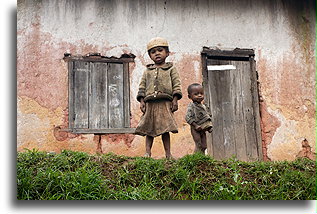



In the mountainous region of Madagascar's Central Highlands, there is a tribe revered for their wood carving talents. They are known as Zafimaniry. Their houses and art are unique among all Malagasy ethnic groups. We were the only visitors to the village on that day and swarms of children constantly surrounded us.


Traditional Motifs


We entered a hut of an important elder. He showed us that traditional Zafimaniry wooden houses were erected without nails. There are not so many of them in Antoetra, the community we visited. This is because of high price of wood, which is now hard to get due to deforestation. It is cheaper to build out of clay or use other materials. When we entered the old chiefs house, we found the simplest interior you can imagine. There was only one room with small windows and no glass. There were no beds or any other furniture; there was no stove, no sink, and no running water, not to mention a bathroom. There was absolutely nothing inside except woven mats on one side, an open fire on the other and a few small everyday items by the wall. The house had no chimney and smoke filled the entire interior. Smoke blackened the ceiling and internal walls. Our host without wasting any time started to explain. Our homes always have a traditional setting, where each corner has a special meaning the most important is the northeast corner of the room where we pray to our ancestors. It actually made sense. Most of the Malagasy tribes share common ancestors that arrived centuries ago not from Africa, as many may think, but from Asia, todays Indonesia, probably Borneo, an island, which lies in the northeast direction from Madagascar. The northern part of the house where you are sitting is reserved for men and guests. The southeast corner is a place to store water. The northwest part of the house is where we keep our toolsthe elder continuedand finally the southwest corner is for the hens. It was the moment we noticed a cage near the door. The host added, chickens are safe here from other animals and people who may steal them.







